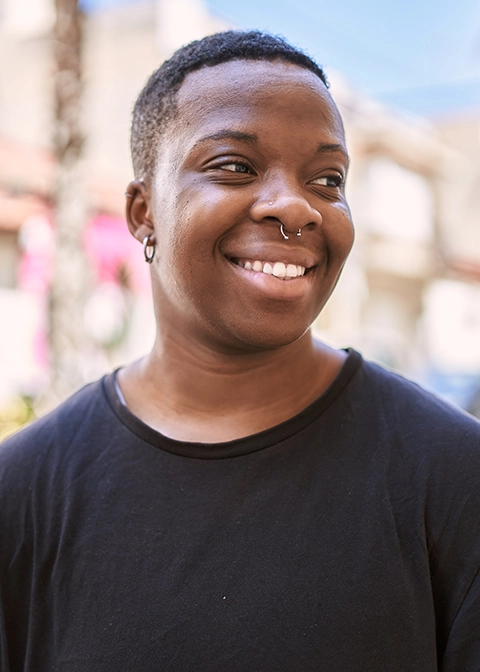Struggling with Gender Dysphoria? We Can Help.
Join a supportive community that gets it. Get professional guidance, connect with peers, and find the support you need to manage gender dysphoria and move toward more gender euphoria.








Gender dysphoria is a psychological condition characterized by significant distress or discomfort due to a discrepancy between an individual’s assigned sex at birth and their experienced or expressed gender identity. This incongruence can manifest in various ways, including a strong desire to be rid of one’s primary and/or secondary sex characteristics, a strong desire to be treated as another gender, or a conviction that one has the typical feelings and reactions of another gender.
The feeling of gender dysphoria shows up for different people at different ages, and in many different ways.
What is Gender Dysphoria
Children often begin to recognize and label gender groups between 18 and 24 months, identifying others as girls, boys, women, or men. By age 3, most children label their own gender. Some may express a strong identification with a gender different from their assigned sex, insisting on being a different gender or expressing discomfort with their assigned gender roles.
During this period, children become more aware of societal gender norms and may feel pressure to conform. Those whose gender identity differs from their assigned sex might experience confusion or distress, especially if their self-perception conflicts with external expectations. They may express a desire to participate in activities or adopt appearances traditionally associated with another gender.
Puberty often intensifies feelings of incongruence for transgender and gender-diverse youth. The development of secondary sexual characteristics can make them uncomfortable, leading to heightened gender dysphoria. Adolescents may seek to express their gender identity more openly, exploring clothing, hairstyles, and names that align with their internal sense of self. This period is crucial for support, as acceptance from family and peers significantly impacts mental health outcomes.
For some, the recognition of a gender identity differing from their assigned sex may occur later in life. This realization can be influenced by increased access to information, supportive communities, or personal introspection. Life experiences, such as significant personal events or milestones, can prompt introspection and self-discovery. As individuals reflect on their lives, they may recognize feelings of incongruence between their assigned sex and internal sense of gender that were previously unacknowledged or suppressed.
What we do know, however, is that those that realize later in life did show earlier signs, but they were either surpressed by fear or not identified as an incongruence of gender.
What's the difference between Sex & Gender?
To understand gender dysphoria, we need to understand the difference between sex & gender.
Prefer video? Watch the first ever Transgender Zone to hear founders Victoria and Christopher walk through both Gender Euphoria and Dysphoria. The Transgender Zone podcast is a great way to learn about all sorts of Transgender Topics.
The Sex You Are Assigned at Birth
Well before you are born, you are assigned a sex in the womb. Whether that be male, female, or intersex, we all start out with a predetermined sex based on a set of instructions in our genetic code. About six weeks a child's development in the womb, those instructions kick in and our external sex characteristics start to develop. When born, based on your external sex characteristics that developed in the womb, you are assigned a sex.
-
Assigned Male at Birth (AMAB): When a newborn’s external genitalia are observed to be typically male due to the presence of a penis and scrotum, they are assigned male.
Assigned Female at Birth (AFAB): When a newborn’s external genitalia are observed to be typically female due to the presence of a vulva—they are assigned female.
Intersex: Some people are born with sex characteristics (such as chromosomes or genitals) that don’t fit typical definitions of male or female. While intersex is a natural variation of human biology, these individuals are often still assigned a binary sex of male or female at birth.
Sex Is Not The Same Thing As Gender
While your sex assigned at birth comes from external genitalia, gender is a more complicated. Gender refers to the roles, behaviors, activities, and attributes that a given society considers appropriate for individuals based on their perceived or assigned sex. Unlike biological sex, which pertains to physical and physiological differences, gender encompasses the social and cultural constructs associated with being male, female, or other identities. It influences personal identity and societal expectations, and can vary across different cultures and historical periods.
Some people feel comfortable with the gender roles handed to them by their culture and some do not. For people of transgender experience, as they age, they experience a divergence between their assigned sex at birth and their internal sense of gender identity. This experience leads to a distress called "gender dysphoria."
The word transgender is a combination of trans and gender, with trans signifying moving or changing states. So transgender simply means that a persons gender identity differs from the sex they were assigned at birth. As a transgender child grows up, they notice that something isn't quite right and it takes some time for them to understand what it is...
Connect with Other Trans Folks Today
We believe that everyone should be able to afford incredible support for their transition, no matter their financial situation. That’s why all of our membership plans include the same benefits: community access, weekly live sessions, our provider directory, and more. The only difference is what you choose to pay.
Access Membership
for those that need it.-
Full Access
-
Inclusive Pricing
Standard Membership
our recommended pricing-
Full Access
-
Sustain the Community
Champion Membership
for those who can.-
Full Access
-
Pay it Forward for Access Membership
Access Membership
for those that need it.-
Full Access
-
Inclusive Pricing
Standard Membership
our recommended pricing-
Full Access
-
Sustain the Community
Champion Membership
for those who can.-
Full Access
-
Pay it Forward for Access Membership
Access Membership
for those that need it.-
Full Access
-
Inclusive Pricing
Standard Membership
our recommended pricing-
Full Access
-
Sustain the Community
Champion Membership
for those who can.-
Full Access
-
Pay it Forward for Access Membership
Access Membership
for those that need it.-
Full Access
-
Inclusive Pricing
Standard Membership
our recommended pricing-
Full Access
-
Sustain the Community
Champion Membership
for those who can.-
Full Access
-
Pay it Forward for Access Membership
Access Membership
for those that need it.-
Full Access
-
Inclusive Pricing
Standard Membership
our recommended pricing-
Full Access
-
Sustain the Community
Champion Membership
for those who can.-
Full Access
-
Pay it Forward for Access Membership
Access Membership
for those that need it.-
Full Access
-
Inclusive Pricing
Standard Membership
our recommended pricing-
Full Access
-
Sustain the Community
Champion Membership
for those who can.-
Full Access
-
Pay it Forward for Access Membership
Listen to Our Podcast
“Accepting myself has been a long and difficult process. Coming out and transitioning has been a lonely experience. But transgender zone gave me a place to feel safe and a community that I could see myself in and feel accepted in."
TJ
“When I attend voice lessons, office hours, or especially the community circle events, it feels like the outside world fades away."
Macy
“One of the most reassuring aspects for me is realizing that others have gone through similar experiences and feelings."
